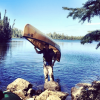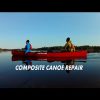Morning Light – A Canoe Built by Campers at Ogiche Daa Kwe
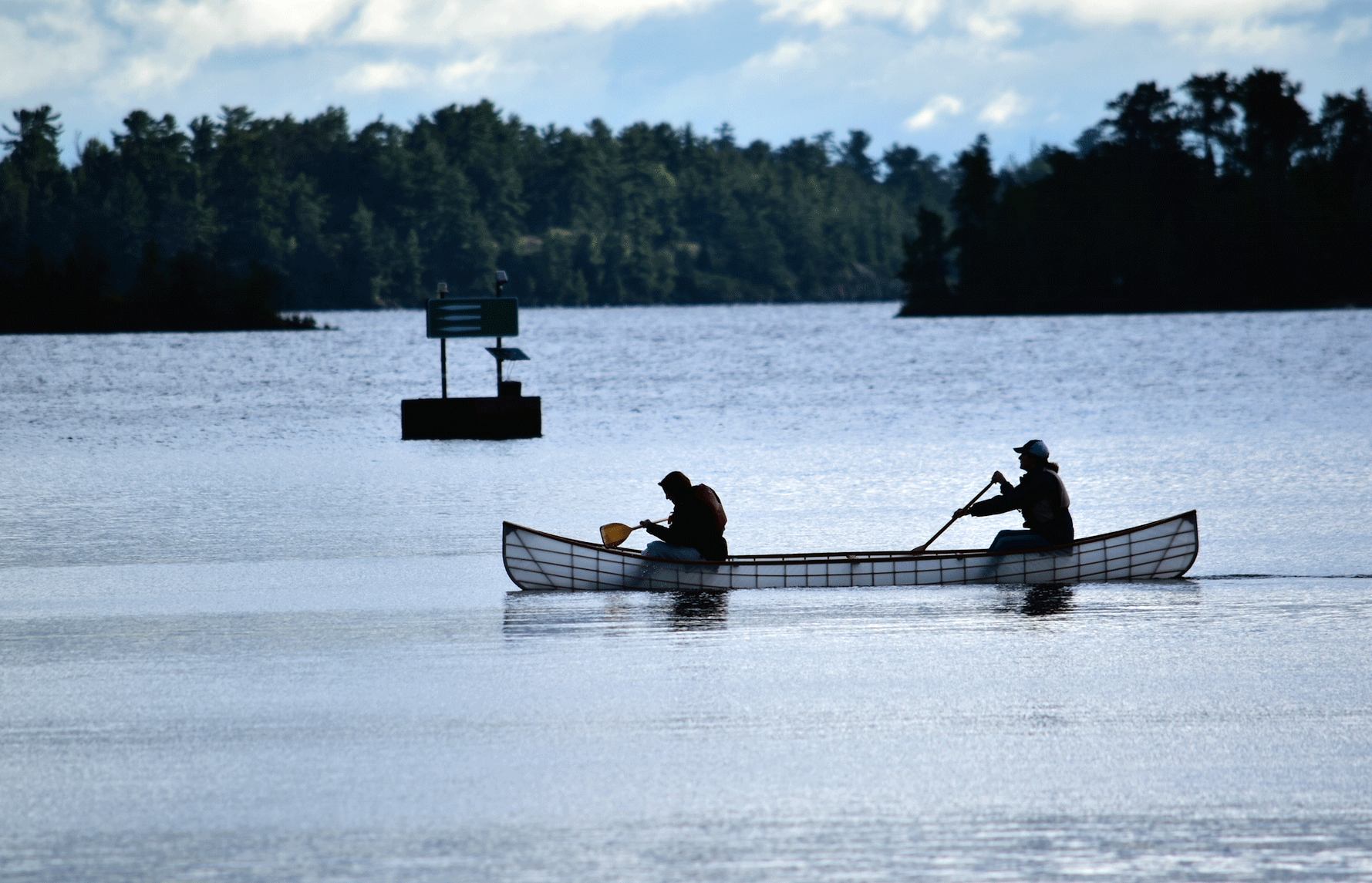
All photos by Liz Hattemer.
By Alissa Johnson
There is something delicate about the look of a skin-on frame canoe. In the sunlight, the wooden frame shows through its skin, as do the shadows of paddlers. Looking down into the boat, the line where water meets air is visible. Yet it is a seaworthy craft, light enough for the youngest and oldest of paddlers to carry, and, at girls’ wilderness camp Ogiche Daa Kwe, a perfect metaphor for community. Last summer, campers and staff at the Rainy Lake camp built a 17.5-foot wilderness traveler skin-on frame canoe. Every generation, from eight-year-old girls to the camp’s 73-year-old weaving instructor, played a hand in building the boat.
“When the boat was finished, everybody that participated in the process wanted to have people know they worked on this boat,” camp director Kathy Dix said. The entire camp voted on names submitted for the canoe, ultimately selecting “Morning Light.” And at an early morning ceremony, the same girls and women who helped build the boat launched it onto the water.
The idea to build a canoe grew out of chance connections, when Hugh Haller, Board President of the Camping & Education Foundation that benefits Ogiche Daa Kwe, ran into Collette King of Urban Boatbuilders (UBB) at a conference in May of 2016. As Partnership Program Manager, King was looking to expand the UBB program’s reach and excited about the possibility of partnering with a Northern Minnesota camp. She saw a great fit at Ogiche Daa Kwe, where campers spend part of their session on wilderness canoe trips. “It was such a great way to close the loop. They already have an intimate connection with canoeing,” King said.
Dix was also immediately on board. In the past, campers had worked with an area craftsman to make things like benches for the dining hall. But this provided an opportunity to build something onsite that combined craftsmanship and art with the functionality of a canoe. And, the project could be completed during a three-week camper’s session.
The project took place in the arts and crafts triplex, where campers also learn things like weaving and traditional Native American crafts. With a gallery and outside deck, King and the girls could move the project inside and out as needed. And, girls of all ages could see the canoe’s transformation whether they participated in building it or not. Dix knew that like other camp activities, some campers would run with the project and others would be less interested. But in such a public location, everyone could benefit from the experience. “I like that those so removed from where things come from see the process, whether they really love it or not,” she said.
Once the project began, King had a rotating crew of builders, with up to four one-and one-half hour sessions a day, with as many as eight girls in a session, sometimes as young as eight, other times middle school or high school age. Some kids were new to the process on a given day, and others came back to work on the canoe again and again. When the campers left for their wilderness trips, the camp “elders” took over and kept the project going in order to finish the canoe by the end of the three weeks. King oversaw everyone’s work, making sure that each participant had a job and the project progressed as planned.
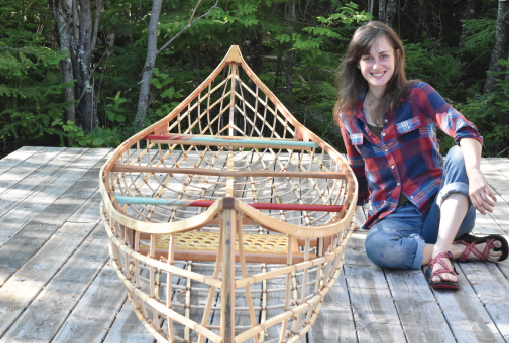
Urban Boatbuilders Partnership Program Manager Collette King spent three weeks at Camp Ogiche Daa Kwe, helping campers and staff build a skin-on frame canoe, which they named Morning Light.
“It is an art for sure. It’s a lot of planning ahead of time and making sure there are enough jobs to keep everybody busy,” she said. She drew on her background in construction volunteer management for Habitat for Humanity, where she oversaw everything from supply acquisition to the volunteer experience, as well as helping Urban Boatbuilders expand into a new space. Dix credits King with making the project such a success for Ogiche Daa Kwe.
“Collette does such a good job finding individual jobs for the ability of the person she’s working with, and she’s able to handle multiple talent levels at one time. I think boat building could have been something altogether different with somebody else, but she’s very patient, and I think it was great a woman was teaching,” Dix said. When a small, slight woman can spearhead the construction of a canoe, it sets an example for campers and what they can do. And that’s one thing that King definitely saw as she helped campers build Morning Light.
People in their day-to-day life rarely make the things they are using, and giving these girls the opportunity to work with tools and build this incredible structure they got to then use—this ‘thing’ they have a relationship with—is amazing. They all have these moments, little moments, where you see them recalibrate what they’re capable of because this is so outside the realm of what they usually do,” King said. In particular, eighteen-year-old twins from Montana took to the process so much that they hope to build a canoe at home. But even the young girls were capable of so much more than most adults would give them credit for. One day in particular, King instructed an eight-year-old to set up the wallpaper steamer, which would be used to bend wood. Not only did she do it exactly right, but she also asked for more to do.
When launch day arrived, one of the camp’s elders—a 73-year-old weaving instructor—carried the boat to the lake. The twins who had been so involved in the building process launched Morning Light onto the water, and the campers assembled watched as a beautiful, functional watercraft that many of them helped create moved across the water. The idea of community isn’t new to campers at Ogiche Daa Kwe—they already pitch in with things like dishes and projects around camp to keep things functioning smoothly. Yet here was something real and functional that they or their fellow campers built together.
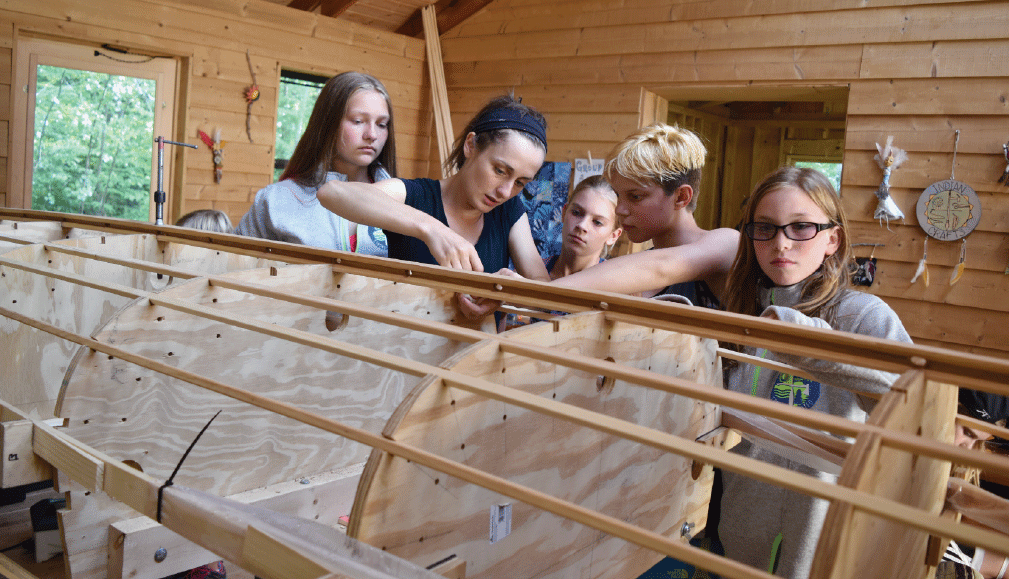
Campers and staff at Ogiche Daa Kwe completed every step of building a skin-on frame canoe. They launched the canoe at an early morning ceremony.
The project was such a success that King is returning to Ogiche Daa Kwe next summer to help the campers build another canoe and a kayak. And Ogiche Daa Kwe’s nearby brother camp, Camp Kooch-i-Ching, also plans to build a canoe next summer under the leadership of Urban Boatbuilder’s lead instructor, Phil Winger.
Morning Light, now a ceremonial canoe for the camp, will hang in a place of prominence, in front of a two-story picture window in the lodge—a visible reminder of what the campers and staff of Ogiche Daa Kwe can accomplish together.
Urban Boatbuilders is a nonprofit youth development program (based in St. Paul, Minnesota) that empowers youth to build the skills they need to succeed in school, work, and life through the building and use of boats. Urban Boatbuilders has guided more than 5,000 youth in building more than 300 boats through their Apprenticeship Program and Partnership Programs in schools, community organizations, and juvenile corrections facilities.
This article originally appeared in Wilderness News > and was republished with permission of the Quetico Superior Foundation.



